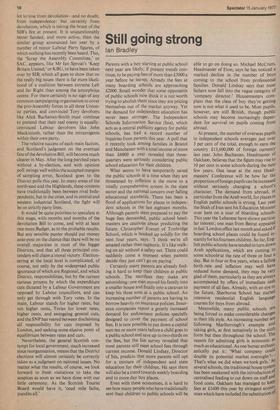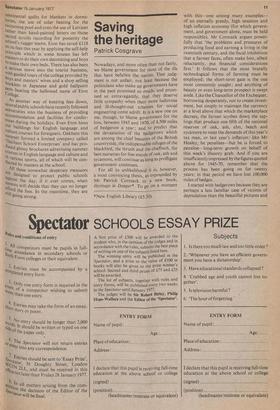Still going strong
Ian Bradley
Parents with a boy starting at public school next year are likely, if present trends continue, to be paying fees of more than £3000 a year before he leaves. Already the fees at many boarding schools are approaching £2000. Small wonder that some opponents of public schools now think it is not worth trying to abolish them since they are pricing themselves out of the market anyway. Yet the demand for independent education has never been stronger. The Independent Schools Information Service (Isis), which acts as a central publicity agency for public schools, has had a record number of inquiries from parents this year. A poll that it recently took among families in Bristol and Manchester with a total income of more than £6000 a year revealed that threequarters were seriously considering public school education for their children.
What seems to have temporarily saved the public schools at a time when they are threatened by inflation is the move to a totally comprehensive system in the state sector and the national concern over falling educational standards. There has been a flood of applications for places in independent schools in the last eighteen months. Although parents seem prepared to pay the huge fees demanded, public school headmasters are cautious about predicting the future. Christopher Everett of Tonbridge School, which is booked up solidly for the next four years, says: 'I think we're all amazed rather than euphoric. It's like walking on air without a safety net. There could suddenly come a moment when parents decide they just can't go on paying.'
Certainly many parents are already finding it hard to keep their children at public schools. The sacrifices they make are astonishing: one man moved his family into a smaller house and finally into a caravan to keep his three sons at a public school. An increasing number of parents are having to borrow heavily on insurance policies. Insurance companies report a greatly increased demand for endowment policies specially designed to cover the payment of school fees. It is now possible to put down a capital sum ten or more years before a child goes to a public school and save up to two-thirds on the fees, but the Isis survey revealed that most parents still meet school fees through current income. Donald Lindsay, Director of Isis, predicts that more parents will opt for a mixture of independent and state education for their children. He says there will also be a trend towards weekly boarding and to more day boy places.
Even with these economies, it is hard to see how many people who have traditionally sent their children to public schools will be able to go on doing so. Michael McCrum, Headmaster of Eton, says he has noticed a marked decline in the number of boys coming to the school from professional families. Donald Lindsay says that most fathers now fall into the vague category Of 'company director.' Housemasters complain that the class of boy they're getting now is not what it used to be. Most pupils, however, are still British, though public schools may become increasingly dependent for survival on pupils coming from abroad.
At present, the number of overseas pupils in independent schools averages just over 3 per cent of the total, enough to earn the country £13,600,000 of foreign currency last year. John Buchanan, Headmaster of Oakharn, believes that the figure may rise to 10 per cent in some schools during the next few years. One issue at the next Headmasters' Conference will be how far the proportion of foreign pupils can be increased without seriously changing a school's character. The demand from abroad, In particular from the Arab world, for places in English public schools is strong. Last year the Shah of Iran sent his Education Minister over here on a tour of bbarding schools. This year the Lebanese have shown particular interest ; one man from Beirut appeared in Isis' London office last month and asked If boarding school places could be found instantly for his fourteen children. So far, English public schools have tended to turn down Arab applications, which are coming t° some schools, at the rate of three or four a day. But in four or five years, when a falling birth rate and inflation may well have reduced home demand, they may be verY glad of them, particularly as they are alwaYs accompanied by offers of immediate cash payment of all fees. Already, with an eye r° the future, Sherborne School has started intensive residential English language courses for boys from abroad.
Meanwhile, many public schools are being forced to make considerable changes in their life style. An increasing number are following Marlborough's example and taking girls, at first tentatively in the sixth form but then throughout the school. The reason for admitting girls is economic as much as educational. As one bursar enthusiastically put it: 'What company could double its potential market overnight That's what we did when we took girls.' At several schools, the traditional house sysrenl, has been weakened with the introduction 0', centralised feeding to cut down on staff and food costs. Oakham has managed to keeP fees at £1600 this year by stringent ecort°i. mies which have included the substitution ° continental quilts for blankets in dormitories, the use of solar heating for the swimming pool and even the use of Letraset rather than hand-painted letters on ,those sacred scrolls recording for posterity the school's rugger teams. Eton has saved £118 O n its fees this year by applying the self-help Principle which in some houses has left masters to do their own decorating and boys to make their own beds. There has also been a serious move into the tourist business, With guided tours of the college provided by °oYs and masters' wives and a shop selling booklets in Japanese and gold ballpoint Dens bearing the hallowed name of Eton College.
As another way of keeping fees down, several public schools have recently followed universities into the business of providing accommodation and facilities for conferences during the holidays. Even Eton hires out buildings for English language and culture courses for foreigners. Oak ham this summer formed a limited company called 19akham School Enterprises' and has prouuced glossy brochures advertising summer Courses in English language and culture and 1,.11 various sports, all of which will be conuucted by masters at the school. All these somewhat desperate measures are designed to protect public schools against the day, if it ever comes, when ,Parents will decide that they can no longer °mord the fees. In the meantime, they are "ill going strong.



































 Previous page
Previous page